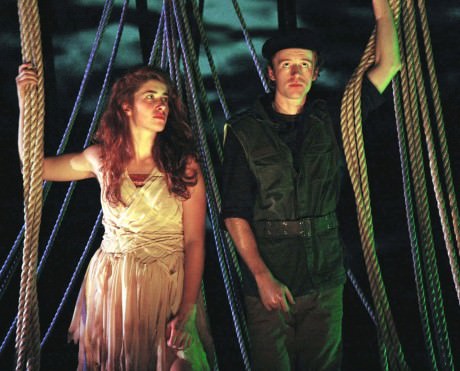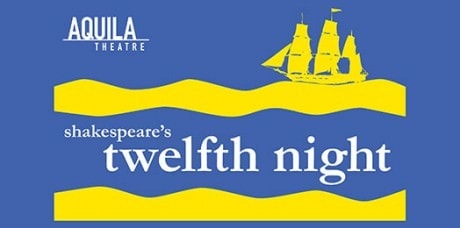The New York based acclaimed professional Aquila Theatre and its cast of superb British and American performers presents Shakespeare’s charming comedy Twelfth Night with never-before-seen innovation, theatricality, and modernity that is not to be missed.
Before the first line is even delivered, the atmosphere immediately draws attention. The stage is filled with eerie blue lighting, backdropped in flickering water projections, with hanging thick floor-to-ceiling ropes reminiscent of a ship’s deck. This unique interpretation of the setting of the first scene is put to thumping, bass-heavy electro-house music, puzzling audiences as to whether they have mistakenly entered into a rave. But once the performance began it was clear that at the heart of the special effects still lay the essence of Shakespeare’s beloved story that has inspired countless books, adaptations, and films.

Act one scene one opens with a shore-washed and thoroughly bedraggled Viola (Harriet Barrow), a young noblewoman who, with her twin brother and the rest of the ship’s crew, has suffered a terrible shipwrecking. Believing her twin brother Sebastian (Calder Shilling) to be drowned, Viola decides to make do with her situation and seek service in the guise of a young man with the Duke Orsino (Norman Murray), who rules Illyria, the land on which she has been shipwrecked. This opening scene is representative of the entire performance in it’s innovative delivery – seemingly more like a ballet than a traditional stand-and-deliver display as Viola and the Captain (Wayne Willinger) jump onto the stage’s hanging ropes and fly through the air in circles mimicking the turbulence of the shipwreck.
The story continues as Viola, under the guise of the name ‘Cesario’ falls deeply in love with the Duke, but the oblivious Duke takes no notice as he instead sends ‘Cesario’ to woo the lady Olivia (Kali Hughes) on his behalf. Olivia, who has been in mourning and has been rebuffing the Duke’s advances, instead falls in passionate love with this new young and handsome messenger. Viola struggles with her deception as she juggles handling the emotions of both herself and the people around her. Eventually, her brother Sebastian comes to Illyria and the complicated love stories become even more entangled, but in the end, the characters all come together to resolve the confusion between Viola and Sebastian, the twins are reunited, and two happy couples emerge from the chaos.
Providing comedic relief through the confusion are the characters of Lady Toby Belch (Lizzy Dive), Olivia’s troublemaking drunkard kinswoman, and Malvolio (James Lavender), Olivia’s manservant. As well, actors Wayne Willinger and Norman Murray both do double duty as the additional characters of Feste and Sir Andrew, respectively, a fool and a pompous, silly knight who conspire with Lady Toby in her shenanigans and poke fun at various other characters. It’s a testament to both these gentlemen’s’ acting prowess that this reviewer was not able to tell that they were the same actors that played other critical roles in the play. Indeed, all-around impressive performances were absolutely the standard for this cast.
Harriet Barrow’s Viola is an emotional firecracker. Dressed in almost military-like fashion in khakis and a woodland vest, her ‘Cesario’ struggles with dodging the flirtations of the ardent Olivia with hilarious results, while also lamenting her own unrequited love. Her longing for the Duke – projected perfectly – coupled with her frustration with his obliviousness is an emotional rollercoaster.
Murray as Duke Orsino is a hit delivering melancholy lovelorn prose about mankind’s capacity of love in his native Irish accent. The Lady Olivia (Hughes) takes a more cheerful approach to her love by throwing herself at the young Cesario with little shame and tricking ‘him’ into returning to her house, with hilarious results. Meanwhile, Lizzy Dive plays the part of the lechery-love, rules-shirking Lady Belch to a tee, stumbling about the stage with a flask in hand and orchestrating a devilish plot against the manservant Malvolio, played to stiff and snobbish perfection by James Lavender.
The comedic nature of Twelfth Night is juxtaposed nicely with the seriousness and somberness of the scene transitions. These unique special effect transition scenes bring the play to an almost fantastical level, thanks to Peter Meineck’s lighting design, Dave Tennent’s projection design, and Gillian Wolpert’s technical directing. Most powerful are the transition scenes in which the identically dressed Viola and Sebastian walk past each other across the stage, shrouded in darkness and with the backdrop of haunting bass-heavy music – a metaphorical moment and very reminiscent of film noir. Though the humorous issue of mistaken identity is resolved to everyone’s happy relief at the end, the serious moments purposely inserted by Artistic Director Desiree Sanchez remind audiences throughout the story that the characters do indeed suffer from such emotions as unrequited love, lost identity, and grief over the believed demise of loved ones. It brings to the play an effect of three-dimensional emotion through non-traditional art form expression.
Additionally, all of the scenes benefited from the stage management of Christopher Marc and the costume design of Clare Amos. Characters were dressed both traditionally and non-traditionally, bringing interesting variance to each person – for instance, Murray the Duke wore a lavish gold-detailed black jacket, while Murray the silly knight wore white shorts, sneakers, and an outlandish wig. As well, the clever utilization of the hanging ropes and bare and simple props moved forward Aquila’s message of the new and modern Twelfth Night.
Aquila Theatre’s interpretation of Twelfth Night is astounding effective and impressively avant-garde – indeed one of those who “achieve greatness”.
Running Time: Approximately two hours and 30 minutes, with one 15-minute intermission.
Aquila Theatre’s 12th Night was performed for one-night-only concert on October 4, 2013 at George Mason University’s Center for the Arts – at Braddock Road and Route 123 in Fairfax, Virginia. For upcoming events, and to purchase tickets, check their calendar.





